

Industry's coal seam gas campaign is a con. Gittins: Fracking fools The plan to address a massive shortage of gas in NSW reveals - or exploits - an ignorance of how markets work.
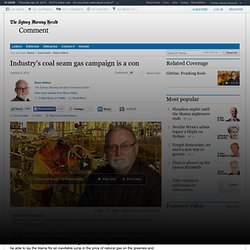
Ross Gittins explains. 8, 2013 The gas industry is working a scam on the people of NSW, in collusion with other business lobby groups and federal and state politicians. It's trying to frighten us into agreeing to remove restrictions on the exploitation of coal seam gas deposits. According to the gas lobby, the manufacturing lobby, the Business Council, federal Industry Minister Ian Macfarlane and former Labor minerals and energy minister Martin Ferguson, we have a looming gas supply crisis in NSW and must unlock our local coal seam gas resources if we're to avoid shortages and the price hikes they bring.
Illustration: Kerrie Leishman. Fantasy budget: Richard Denniss on broadening the tax base. Last week Crikey’s Bernard Keane designed his fantasy budget — setting priorities based on economic sense and community need alone.
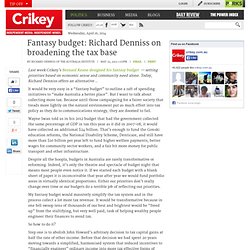
Today, Richard Denniss offers an alternative … It would be very easy in a “fantasy budget” to outline a raft of spending initiatives to “make Australia a better place”. But I want to talk about collecting more tax. Because until those campaigning for a fairer society that treads more lightly on the natural environment put as much effort into tax policy as they do to communications strategy, they are doomed to fail. Go Home On Time Day. Top of worry list: work, work, work.
'Future career' concerns created the greatest anxiety for both men and women.
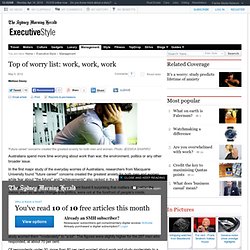
Photo: JESSICA SHAPIRO Australians spend more time worrying about work than war, the environment, politics or any other broader issue. In the first major study of the everyday worries of Australians, researchers from Macquarie University found ''future career'' concerns created the greatest anxiety for both men and women, while fear about ''the future'' and ''achievements'' also ranked in the top five. Researchers from the psychology department found it surprising that matters dominating the media, such as climate change and politics, were not at the forefront of people's minds. ''Worries were much more personal, and at high levels that people said affected their lives and their health,'' said Associate Professor Jennifer Hudson, from the Centre for Emotional Health.
Advertisement ''A lot of people tended to worry about work, social interactions, their appearance and those sorts of areas.'' Who Moved My Weekend? Weekends, work, it’s all a blur.
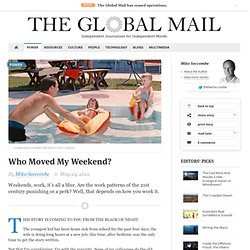
Mining tax 'makes good sense' - Business. Lew's grave mining boom warning. Last week marked an interesting evolution in the public debate on the Australian mining boom.
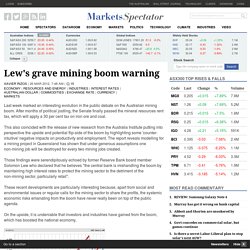
After months of political jostling, the Senate finally passed the mineral resources rent tax, which will apply a 30 per cent tax on iron ore and coal.This also coincided with the release of new research from the Australia Institute putting into perspective the upside and potential flip-side of the boom by highlighting some 'counter-intuitive' negative impacts on productivity and employment.
The report reveals modelling for a mining project in Queensland has shown that under generous assumptions one non-mining job will be destroyed for every two mining jobs created. Source: ASXPutting aside the details of the mining sector's balance sheets, the All Ordinaries Index shows how investors on the Australian sharemarket have been large beneficiaries from the boom during two notable 'bull rallies', marked in the chart above, in 2003-08 and 2009.
Yes, the Government should set home loan rates. No, the Government should not set home loan rates. Even More Super Women. Women tend to live longer than men — which in the case of superannuation tends to magnify the financial disadvantages they face lifelong. Melissa Fuller is only too aware of the irony of her position. Fuller is preparing a submission to the Sex Discrimination Commissioner, setting out the reasons why her firm should not be pinged for discriminating against men with its plan to pay higher superannuation contributions for its female employees. She is more aware than most of the fact that superannuation looms large among the areas where women are severely disadvantaged. Fuller is an actuary; assessing risk and uncertainty, and measuring demographic influences on financial arrangements, are her business. An Unproductive Obsession. We hear a lot about how unproductive Australia is. New reports suggest the culprits are not who you’d expect: it may be less the workers than their bosses.
Even as millions of gallons of oil continued to flow from the blown-out Deepwater Horizon drilling rig into America's Gulf of Mexico in June, 2010, analysts at JP Morgan Chase came out with the good news. According to their analysis, widely reported at the time, the losses to the fishing and tourist industries and the costs of a six-month moratorium on deep-water drilling would be more than offset by spending on the cleanup. Despite the deaths of 11 workers, the vast pollution, the 150 million to 200 million gallons of oil spilled, the whole thing was, in economic terms a good thing.
National Press Club Monckton v Denniss. TAI Debate debrief. Yesterday I met my first Lord and, like the debate itself, the experience was not quite what I expected.

Lord Monckton has made a career out of not listening to people. He doesn’t listen to scientists, he doesn't listen to journal editors and yesterday he repeated that he would not listen to the House of Lords itself. But when we met before the debate he was certainly cordial and many would argue charismatic. The rules of the debate stated that unless we could agree on the order of speaking it would be decided by the toss of a coin.
Climate change ... Wrong Monckton simply can't get his House in order. The House of Lords says that Christopher Monckton is not entitled to claim he is a member of that House, but he disputes this.
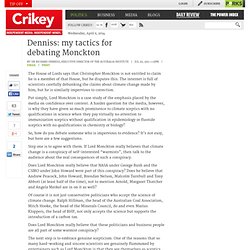
The internet is full of scientists carefully debunking the claims about climate change made by him, but he is similarly impervious to correction. Put simply, Lord Monckton is a case study of the emphasis placed by the media on confidence over content. A harder question for the media, however, is why they have given so much prominence to climate sceptics with no qualifications in science when they pay virtually no attention to immunisation sceptics without qualification in epidemiology or fluoride sceptics with no qualifications in chemistry or biology?
So, how do you debate someone who is impervious to evidence? It’s not easy, but here are a few suggestions. Debating Lord Monckton - The Drum Opinion. Find More Stories Debating Lord Monckton Richard Denniss If your doctor told you that you had cancer and Lord Christopher Monckton told you to ignore their advice would you listen to him? What if he told you not to immunise your children or drink fluoridated water? Australia Institute tai.org.au. Aus Institute Channel Richard Denniss on The Conversation. Politics in The Pub: Australia Institute’s Richard Denniss with Greens Leader Senator Bob Brown [video]